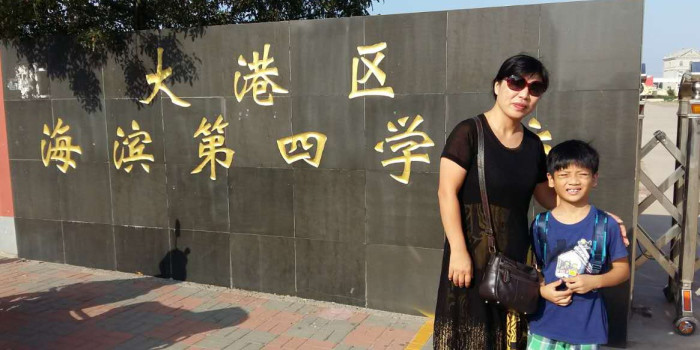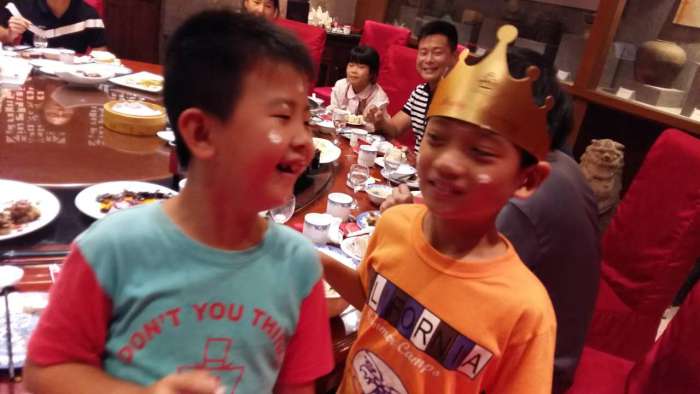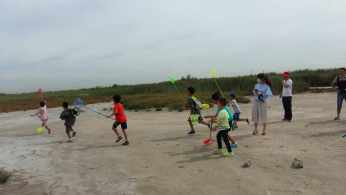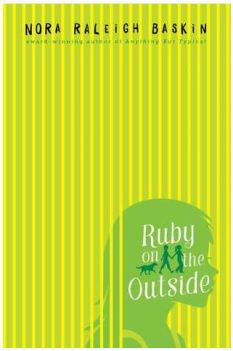
I would probably be the last person you’d expect to send her children to regular school in mainland China. Known for its rigidity and highly-pressurized environment, it is the exact opposite of the ideal education I want for my kids. I would love to send them to a progressive or democratic or even a Waldorf school, but none of those options exist where we live. I would love to homeschool but I am ONLY for homeschooling when there is a community of homeschoolers, unschoolers or worldschoolers with whom they could have regular interaction and activities. I would love to homeschool but ONLY if I can hire tutors for the academic portions and there are a number of non-academic options to pick. In Manila, homeschoolers can study theater, hip hop dance, cooking, speech, football and other courses with fellow homeschoolers.
I believe strongly that education should happen within a community. It is not ONLY the parents who should be the main teachers and it should not even be just the school teachers. Children should be exposed to as many positive people — mentors, coaches, inspiring leaders — as possible.
We live in a town where the only option is the Chinese public school. I taught English in a university here and my students told me horror stories about school and how it got worse and worse leading up to the gaokao in high school. I definitely do not want my children to attend high school in China and I do not want them to take the gaokao, but I still believe that the first two or three grades in public school is useful and tolerable to get the basics of learning Chinese characters. However, after the second or third grade, I would like my kids to switch to a progressive school in Manila.
That is my opinion. Sadly, it goes against the opinion of the other parent in this equation. So that is why there is an awkward stalemate that can only be mended perhaps through time or not. In any case, school starts today. We shall see how it goes.
There are cases of homeschoolers learning to read on their own, but that’s in English. I wonder if that’s possible in Chinese because it is a more complicated language. You have to know hundreds and thousands of characters to be able to read so there has to be a methodical way, not random or casual which can happen in studying English. There are reported cases of children who learn how to read in English without any instruction. Dr. Peter Gray wrote about it in this article: Children Teach Themselves to Read. It would be interesting to see if there are any cases of this in the Chinese language which is quite hard to imagine since there is no Chinese alphabet.
I went to visit some Chinese homeschoolers’ houses and they had bookshelves bursting with materials that it seemed that they must be echoing what the schools teach but in less time because the student-teacher ratio is much less. Still, homeschooling in China must take an inordinate amount of effort on the part of the parents. It can only be done through a lot of commitment and discipline.
My friend, Susan and I want to start a library in this town. We talked about it before we left Dagang Youtian one year ago. I thought she would be able to start something in her house but it turned out her husband wanted to make use of the extra room and it couldn’t be allocated to the library dream. Susan recently organized an outdoor activity for kids collecting insects in the reservoir and that’s how we started talking again about the dream.
There is no library in schools or small towns here in China. Only the big cities have public libraries. That’s another reason why I wouldn’t want to homeschool in China. Resources like libraries are paramount. Plus, the fact that there are so few homeschoolers, the kids won’t have anyone to interact with during the daytime when all the other kids are in school. In the Philippines, America and other countries, there are existing wide networks of homeschoolers that one can tap into. China also has but not in the small towns where we happen to be. (Here’s the China Homeschooling website.)
Oh, and I forgot, the most important reason why I choose to send my kids to Chinese school: Joshua and Jimmy both really, really love to be with other kids. They thrive, they enjoy and I think they would learn more in an environment where they are with other children. I don’t know if the teacher would be a clincher later on and could be a factor to discourage them eventually but as I said, we need to wait and see.
This past year, my husband, two sons and I have traveled from Tianjin to Dali to Manila to Xishuangbanna to Bali to Xishuangbanna to Manila to San Francisco driving to New York with stopovers in Canada and then back to Manila and Tianjin. After the first few weeks in America, I already thought, I don’t think I can do long-term traveling unless it’s something work or study related. After living off our backpacks and bags, I also sensed my children were ready to settle down and I kept promising them that we would get a house, put them in school and get a dog. We were ready for something more stable while traveling can always be done during the holidays.
One of my close friends said that I shouldn’t worry too much about putting my kids in regular school in China because with two very unconventional, out-of-the-box parents, they would be able to balance it all out and come out of the strict Chinese system relatively unscathed. They would still end up with an expansive view of the world.
Another friend told me I shouldn’t worry about the pressure that comes with Chinese education because if the parents don’t put added pressure on the children, then it’s more relaxed for the child. My friend went through the same Chinese school system and her parents didn’t pressure her so she grew up very happy and relaxed from elementary all the way up to university.
Everything is a work in progress. We should not be afraid to try different ways to achieve the goal of providing the best that we can for our children.



This is the activity my friend, Susan organized for kids to explore and enjoy the outdoors:





Advertisements Share this:





